| The biggest thing about the bolt action Evolution is that it is legal in states that don’t allow a closed action muzzleloader in their special “primitive” or muzzleloader season. You can see the #209 shotgun primer in the Evolution, making it an affordable inline muzzleloader legal in nearly all states. The modern inline muzzleloader has virtually taken over the deer hunting market because the ignition of the powder charge is virtually perfect, even with specialty powders that have a much higher ignition temperature than straight black powder. This Hodgdone Triple Se7en pelleted Magnum load had no failures to fire whatsoever is is ballistically superior to virtually every other powder on the market. The Evolution has a 1 in 28″ twist, making it suited for plastic sabot encased copper jacketed hunting rounds. This is a 250 grain Hornady SST that is .45 caliber, set into a plastic sabot for the quick twist .50 caliber bore. We can’t say that this accuracy is the best the gun can do, but for an average hunter in the woods resting the gun on a branch, 4-6″ at 50 yards will probably be expected accuracy with these magnum loads. It is a big boom and a big kick and the gun jumps a great deal, but these are all vitals shots at what is the most common range for whitetails. For the three Triple Se7en Magnum pellets and the 250 grain SST, we averaged about 2400 feet per second at the chronograph. That is nearly identical to factory 444 Marlin ballistics. IMR White Hots are also a very popular load for the inlines, and the ballistics came out just under the Triple Se7en Magnum pellets, and still formidable for whitetail deer, also using 3 pellets. If your state allows #209 primers but requires that they be exposed to the elements, like a traditional sidelock muzzleloader, the Evolution has this gap that you can see the primer through. Beware though that if you plan to mount optics on the weapon you better test the splatter from this gap first. We did not test this. The idea of this gun is to hunt the “primitive” season with as many modern tools as possible. These fiber optic sights on the Evolution are amazing and glow bright even in late dusk conditions. They front bead nests into the rear sight perfectly. You have to try these sights! The Evolution is not just modern outside. The trigger resembles a rifle trigger group you would expect on a bolt gun and is nothing like what you see on primitive muzzleloader designs. The Vista camo on the stock is crisp and clean, and the fit and finish of the gun would never tell you that it is an inexpensive firearm. They really have perfected value at the Traditions plant in Spain, and the destruction of the Euro has kept the price of Traditions products very reasonable. Taking the gun down for cleaning is much easier with this gun than many other muzzleloaders. It comes with a wrench that is the same diameter as the bolt and you slide it in to unscrew the nipple assembly and breech plug. The action separates from the stock with these two bolts, but you really don’t seem to have to take it down for cleaning. You do have to take apart the bolt though. It gets a good deal of soot from the blowback. This is the combination firing pin, for #209 shotgun primers, and cap smasher for #11 and musket caps. |
Traditions Performance Firearms
https://www.traditionsfirearms.com/evolution
If you are already a deer hunter but have never taken advantage of your state’s muzzleloader season, this spring might be a good time to get comfortable with a modern day muzzleloader from Traditions Firearms. Every state except Montana has a special extra season for muzzleloaders, and Pennsylvania even has two of them, one reserved just for flintlocks. Muzzleloader season is a quieter time in the woods, with fewer hunters, and though I was unable to find any kind of total for deer taken nationally with muzzleloaders, suffice to say that the muzzleloading market wouldn’t be so expansive and competitive if that extra week or so of hunting didn’t give you a competitive advantage.
We reviewed the Traditions special modern flintlock for Pennsylvania’s late season hunt back in the fall and they were nice enough to send us yet another gun. This one is a modern “inline” muzzleloader, the most common type these days, fired with a #209 shotgun shell primer. The Evolution is a bolt action, making it carry and feel very similiar to a regular bolt gun in the way it carries and handles in the field. And as with the other Traditions rifles I have seen, it is a ton of gun for the money. On the website they have the MSRP at $329, but I found them around the web for well under $300.
Inline muzzleloaders are a creation unto themselves and have gained enormous popularity. If you are a traditional rifle shooter and haven’t really looked into how muzzleloaders work, the inline system is different than the historical guns from before the cartridge era. The #209 shotshell primer on an inline is directly “in line” with the gunpowder, unlike traditional percussion actions where the #10/11 or musket size cap sits on the side of the barrel and the fire blast from its ignition enters through a hole in the side. Metallurgy and technology being what they are today, the full force of the charge can now be in line with the ignition system. This is more reliable, and it gives you more flexibility with the types of powder you can use. Coupled with modern sights, modern stocks, and even optics in many states, the modern inline muzzleloader is at a nearly zero disadvantage to cartridge guns. One shot one kill applies of course, but they’d call it harvesting instead of hunting if it was supposed to be easy.
This Evolution is legal in most states for muzzleloader season, and it is specifically legal in many of the Northwestern states that have a rule regarding the “primitive” ignition system required on a muzzleloader. In Washington, Idaho, and Oregon, the law specifies that you have to be able to see the cap or primer. This rules out a lot of inline systems that have the cap hidden and protected from the weather. The Evolution protects the cap somewhat, but it can be seen from the side, making it legal. And if the laws end up getting more stringent in these states and they begin to disallow the #209 primers in favor or traditional #10/11 caps or musket caps (the size on Civil War guns), the Evolution comes with holders for both sizes, as well as a special firing system designed to both punch a primer and smash a cap. The thinking on all of these regulations is to try to keep the “primitive” season as primitive as possible, even though companies like Traditions and many others push the envelope in every way they can, regardless of how they write the law. Every states is slightly different and some are more stringent than others. Traditions has a basic guide downloadable here that you can look up your state to see what oddities exist for your extra time in the woods.
One thing that the #209 primer gives you is the ability to use one of the modern gunpowders that are safe to shoot in your muzzleloading rifle, but that aren’t as dirty, difficult to clean, and potentially damaging to your gun as regular black powder. Regular black powder, like Goex or Swiss in the rifle sized FFg granulation, is downright nasty. The smoke is cool, but the smell is a little over the top, like rotten eggs, and even with a top notch coating like the CeraKote on this Evolution, the gun will rust by morning if you don’t clean it with warm soapy water as we explained in the PA flintlock article. You can only fire one or two shots between cleanings with real black powder as well, and then the projectile won’t fit down the bore anymore from all the residue that collects and sticks to the metal (this is why Civil War bullets were generally much smaller than the bore). The modern powders give you the smoke and the boom but not the mess, difficulty, and potential damage, and the new ones don’t even have any smell. They also totally rock from a ballistics perspective.
I tested the Evolution with the pelletized version of Hodgdon Triple Se7en in a special magnum load made just for these super modern guns. My average velocity with 3 pellets, 150 grains of powder, with a 250 grain Hornady SST plastic saboted bullet, was about 2400 feet per second, which works out to about 3200 foot pounds of energy, nearly identical to a 444 Marlin, which is considered a formidable cartridge for every game animal in North America and most of the rest of the world. IMR WhiteHots, also made by Hodgdon, came in just under that, and with these kinds of ballistics I didn’t bother to try anything else. If you can fire #209 primers in your state, I would use one of these two powders in the Evolution. The gun does kick pretty hard, but hey, one shot, one kill, one bruise.
The twist on these modern guns is quicker than older style muzzleloaders. The Evolution is 1 turn in 28 inches, making it ideal for the plastic sabot bullets you see in the pictures. Traditionally (and yes, Traditions makes plenty of these old style guns as well), a muzzleloader fires a round ball that rides the rifling on a patch of cloth. Later examples shot conical slugs, but again, often they were much under bore diameter because of the black powder fouling. The plastic sabot bullets allow you to load from the front, yet grab the rifling with a modern jacketed hunting round. The plastic falls away as soon as the bullet leaves the barrel, and the quick twist is able to stabilize the heavy 250 grain bullet giving it great accuracy at normal deer hunting ranges.
Accuracy is a bit of a touchy subject for this article because we didn’t use our resident US Army Sniper Ben Becker for this one. Looking on the Traditions website, the gun probably does a good bit better than the 5 shots into about six inches I was able to get from a sandbag at 50 yards. The nice thing was that like the PA flintlock article gun, this gun shot almost to point of aim out of the box. It is great when you don’t have to walk shots around the target trying to get a gun to shoot to point of aim. And keep in mind, full snot loads like this 150 grains of magnum Triple Se7en generally are not going to be the most accurate load for a gun like this regardless. Though the Evolution can for sure handle it, I’m sure this kind of power rocks its world. Rested on a tree branch these would have all been viable vitals shots at what is about the most common whitetail shot distance in North America.
The first thing you will notice when you take this Traditions Evolution out of the box is the elegance of the fit and finish. It would be unjust to not mention it. The stock is a crisp and clean pattern of fall foliage, and the buttpad, grip cap and the action itself all mate up nearly perfectly with the soft touch plastic stock. The fiber optic sights are metal, fully adjustable, and made by Williams. If you can get your hands on one of these in a gunshop try the sights. For me they are one of the more comfortable sight pictures I have seen on a rifle. One word of warning about optics though. If they are legal in your state and you prefer optics to open sights, make sure you test the mounts with a carrot or something before mounting your rings and scope. There is quite a bit of blowback from the primer and it is almost definitely going to dirty your scope. Just the primer alone throws quite a bit of carbon, and with a magnum load the whole breech area gets a good coating of soot. Unlike some reviewers I googled though, I didn’t see that the bolt area bound up in any way with the Triple Se7en. It may happen with black powder or Pyrodex, but with Triple Se7en a wet patch down the bore barely comes out dirty after five shots.
The ramrod on the Evolution is aluminum, and that is about the only thing I can say about the gun that I don’t like. On a modern gun I guess it has to be a modern material, but I found that it gets scratched easy unless you are careful, which I generally am not. The takedown and cleaning of the gun takes some thought, but it isn’t hard. It comes with a bar that you feed into the bolt sleeve instead of the bolt, and you use this bar to unscrew first the cap holder then the breech plug, which allows you full access to the inside of the barrel for cleaning. Using Triple Se7en you probably don’t have to take out the breech plug, but beware that if you don’t take it out and lubricate the threads before firing these magnum loads, it may stick. I didn’t, and mine did.
The trigger on the Evolution is adjustable but the factory has to change it for you according to the manual. Mine broke cleanly with no creep at 4 1/4 lbs consistently. Personally, if you are in the habit of dunking your black powder barrels in hot water to clean them, I would remove the trigger assembly from the gun first. And make sure to take apart the whole bolt. Make sure you take pictures of it beforehand so you know how to get it back together, but once you get it apart you will see that it gets pretty dirty in there. I was able to get it back together without looking at the manual, so you will probably be able to do it easily as well. Unlike sidelock muzzleloaders, you don’t have to take the Evolution out of the stock to clean out carbon. I took mine apart and it doesn’t pick up any carbon at all. The system is really designed for ease of use, to make your muzzleloader hunting about the hunting, not about dealing with the gun.
The Evolution is not a huge risk to give muzzleloader season a shot in your hunting experience this fall. Rather than try to figure it all out in October, the spring and summer are great times to be able to take your gun out and shoot it for fun (though maybe not with the full snot loads). With pretty easy cleaning and what seems to be a really simple and reliable shooting system, the Evolution might be the first and last muzzleloader season rifle you’ll need. It is really that good. And if you live in one of the more restrictive muzzleloader states, the Evolution may be your actual lowest common denominator for an easy and effective muzzleloader. Either way the Evolution isn’t going to be a rifle that lets you down.



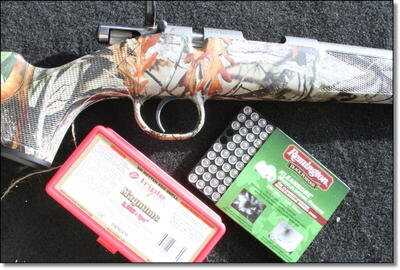
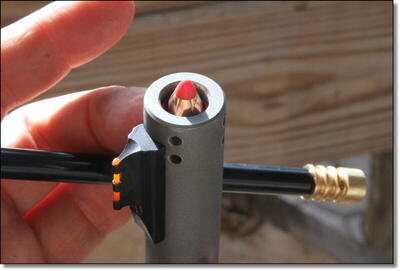
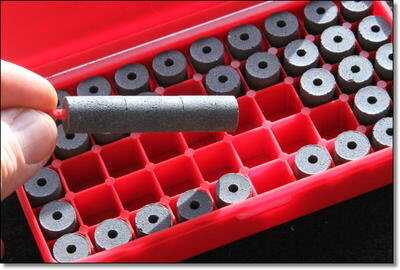
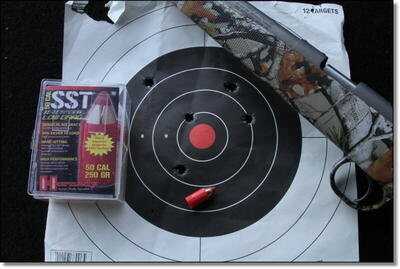
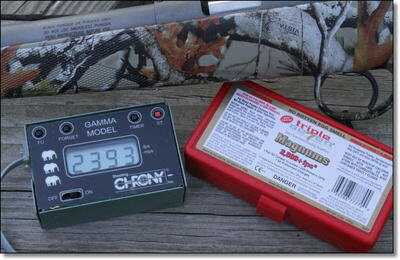
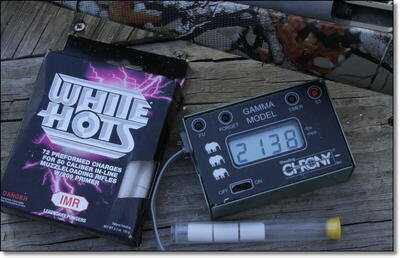
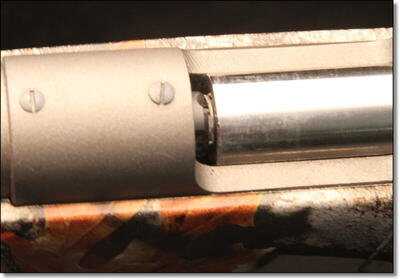
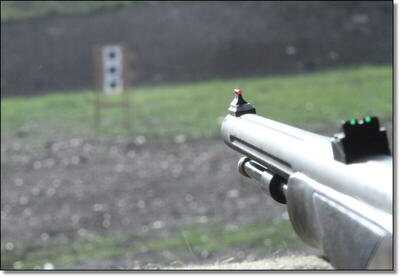
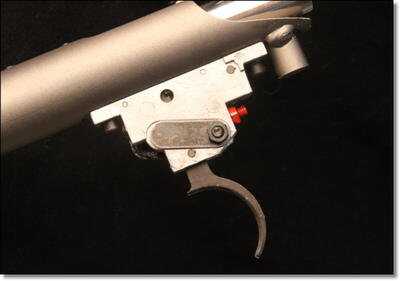
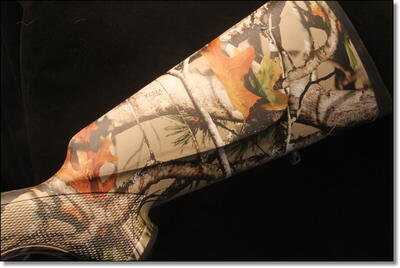
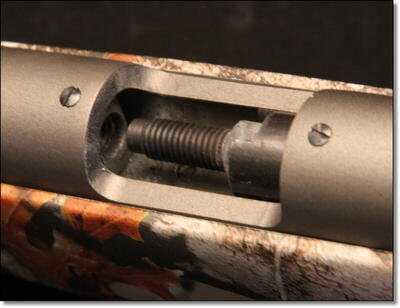
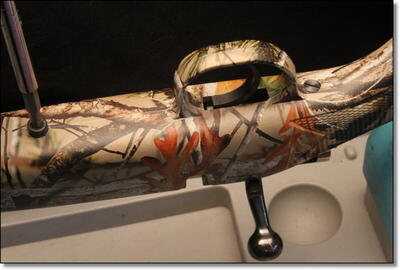
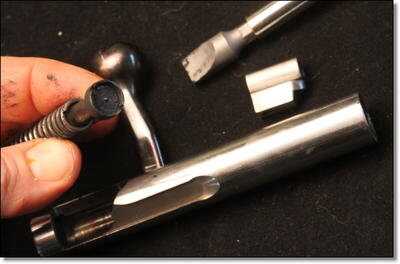
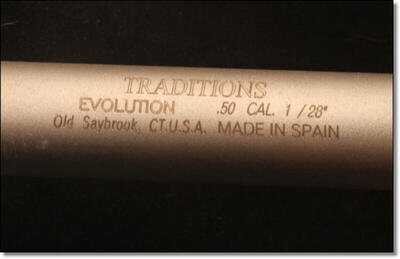
don’t buy traditions they don’t back their products. I have a traditions evolution and bolt handle fell off. the solder or weld was barely there don’t know how it lasted since 2011. I called traditions and they said they wont warranty it and tried to sell me a bolt for 150.00
I am looking for a trigger assy. for a traditions timber ridge 209 muzzleloader.
To echo what was said below… You guys are dumbasses. You shot 180gr out of a gun rated for 150. Lucky you didn’t blow your face off. Hope nobody else is risking blowing their faces off reading this b.s. Will never read this site again.
This article needs one MAJOR correction: the pellets you are shooting are 60 grains EACH!!! – that’s 180 TOTAL grains! Magnum Muzzleloaders are rated for ***150 grains total!*** This is a very unsafe practice that should be stopped IMMEDIATELY! Unless that manufacturer states 180 grains of propellant is safe, which I doubt. PLEASE note this in your article before some one including yourself gets hurt!
I have just got a Traditions Timber Ridge 50 cal. know nothing about these gun’s trying to find out what it is , what it’s worth, so on but can’t find any thing on a Timber ridge ? what is the dif. between in-line and primer?
I do a little target shooting with a traditions in line that is about 13 years old. it is a 50 caliber rifle and I load it with anywhere from 50-80 grains of pyrodex powder for rifles. I have a low power scope on it about 2-3 power and I can shoot groups about 2 1/2 inches at 100 yards. I fire a sabboted bullet using 240 grain lead bullets that I use in my 44 magnum revolver. the first round has some lube on it and I can fire 23-30 rounds easily before any loading problems appear. anti sieze compound on area around where primer seats prevents any siezure of parts, and clean up although messy is easily accomplished with hot water and soap being pumped up and down barrel using cotton swab on rod.all around a nice gun to shoot and hunt with. best Larry
Scott, Well shucks, I thought that’s kind of what I was going for. Disparagement doesn’t work for me going in any direction. As far as my rock-on-steel gun, it wouldn’t pass your extreme test, but anyone from the late 18th through early 19th centuries wouldn’t go “What the hell is that!?” if he stumbled accross my gun. Since I have never owned a firearm with which I could legally take a deer in IN, I don’t usually concern myself with the bizare and overly complex regulations concerning such pursuits. Ever since the evening I totalled my car by hitting a deer on I-74 near Batesville, it has been my contention that it should be legal to take deer from the highways using spotlights and quad .50’s. No such luck! The main point I was trying to make was that I hate to see old, worn-out prejudices repeated, making “more traditional” firearms look bad, inadequate, unreliable, and just nasty,(oh, the stench!). The NMLRA is an inclusive bunch. Sure, you’ll find people that will look at you like you have a social desease if you show up at some matches with a plastic gun, (kind of like what must have happened when the AR’s started showing up at high power matches), but thier mission statement is clear. Many Happy Returns of the Day
I’m not a guy that likes sniping at other shooters because of their choice in firearm, and some of the responses to this subject are a little too vitriolic for my taste. That being said, “traditional” should mean something, and it disturbs me that truly traditional muzzle loading firearms are disparaged (accuracy, reliabilty, clean-up, etc.), to make modern contraptions more appealling. Fourteen years ago I made a fullstock .40 cal. flintlock rifle. It goes off with regularity, (even in light rain), will out shoot this modern gun as tested, will shoot a match (twenty-five to thirty rounds) without cleaning, and, in spite of the fact that I abandoned the hot-soapy-water and buckets-of-elbow-grease method of cleaning, it has not desolved into a pile of rust from that nasty black powder! The National Muzzleloading Rifle Association is still operating in Friendship, IN. USE IT!
VOS, the disparagement usually runs the other way–“traditional” shooters telling inline shooters that their guns are illegitimate. See my post above regarding that point.
What “traditional” means depends on who writes the game laws and I think we’re better off with as liberal a definition as possible. Why? Simple. You say you built a .40-cal. flintlock. Was the barrel forged and rifled by hand using tools built by hand? Was the tree used for the stock cut down with a bow saw and shaped and inletted all by hand using tools all built by hand? Do you cast your own lead balls using a pot and dipper over a fire using lead mined by hand? If you take so-called “traditional” to its logical conclusion, then that is where it goes. There are probably only a handful of hunters who can say they hunt with an honestly “traditional” gun by that definition, and bless their hearts, I think that’s great and I will always do everything I can for them. But there just aren’t enough of them to even put muzzleloader hunting on the map and they need the inline shooters in their camp just as much as the inline shooters need the outside hammer shooters.
That rant about “traditional hunters” is one giant nit pick. We all know what “traditional ML’s are, what the rule was set up for, and why the special seasons. Mayer you know exactly what is meant by “Traditional” and it does NOT include scope sights, sabots, smokeless powder, inline with “Mag” loads or shotgun primers. Many of us spent long unpaid hours trying to get legislation passed to use “traditional ML’s” and your inlines are not even close. They are simply cheater guns that proved a profit center for manufactures, and yes they are cheater guns. There is simply no way you can try to spin it, as to not know a “traditional” vse a inline. I seriously doubt those that lobbied for “traditional early season” and voted for it, would now do same again. But then “sportsman” getting a wee bit less everyday, perhaps why kids are hunting/shooting less, less licenses sold each year, the “wink-nod gee it is technically a ML” is not selling to well as far a spirit of law goes. But now some states also allow crossbows (with scopes) during special bow seasons, another “profit center” for manufactures.
Most of the “traditional” (AKA long hunters) have no objection to inlines, they are an evolutionary step in ML, what we would like to see it them stop sponging off traditional ML and get own season as downgrades the reality of why ML season was set up. your bit on “Traditional” reeks of desperation as does accuracy of article on traditional ML shooting.
primitive weapons. if you can’t shoot a flintlock you ain’t shooting a true muzzeloader.
primitive
I know the accuracy of this gun to be much better. I would be interested as to the cleaning regiment he has when shooting his test groups…open sights??? is this a fair assessment of accuracy?
No the article says that.
“We can’t say that this accuracy is the best the gun can do, but for an average hunter in the woods resting the gun on a branch, 4-6″ at 50 yards will probably be expected accuracy with these magnum loads. ”
This is TERRIBLE accuracy and hardly worth reporting. I don’t care what the other features of the gun are because a 6″ group at 50 yards is a 12″ group at 100 yards. It’s been said before, only accurate guns are interesting.
If you’re going to add anything but flintlocks, just make the regular firearms season longer and be done with this foolishness. Next thing, they’ll be pushing laser weapons!
Got to ask, any of the “ML’s” now equipped with such sites, as if scopes OK why not add more to the lies of “this is a ML as it was defined when special seasons started. Remember all to well that when we got ML seasons, some predicted they would be abused as all to many just love to cheat and bend the rules. None every thought it would be this bad, even smokeless powder in use?
fw, in December, 1997, I prepared a report for John Frazer of NRA/ILA Federal Affairs on inline muzzloaders. That was at a time when Congress decided it needed to regulate muzzleloaders as firearms and my report was requested to help stop that legislation. I hear your argument about what a “real” muzzleloader is all the time, so I fished out that report and want to share some information with you.
04/08/1775 Patent #1095 was granted to Henry Nock, William Jover and John Green for a “new invented firelock…the lock is fitted in the stock and entirely concealed.”–This is an enclosed breech.
11/27/1826 Patent #5421 was granted to Benjamin Newmarch for “improvements on fire-arms…The blow is given by a bar or punch acting in a line with the axis of the bore of the barrel, in the rear end of which is the touch-hole.” This is in-line ignition.
There are more than 30 other patents quoted in the report including electric ignition (Patented in 1863 and 1865); ignition by compressed air (Patentened 1814 and actually used in the Daisy V/L in the 1960s); Inline flintlocks (Patented by Manton in 1809); and inline percussion (Patented by Horton in 1855, Bently in 1844, Knauth in 1858, Dougall in 1859, Johnson in 1862, Cooper in 1840, Cook in 1824, Lawden in 1862, Davis in 1824, and Newton in 1858).
There is no doubt that in-line and outside hammer ignition were in parallel development. Your argument boils down to you wanting to exclude guns based on how they should look, specifically how YOU think they should look. That’s not an argument the shooting industry needs.
Agree on what was said that your lack of front loader knowledge is deplorable, more so from organization such as GA. First the front loader special season was set up for what many of us call “Real front loaders”, NOT some sort of thing the mfg’s push out for more profits, then play games to try and make them “legal”. Way back when helped out to get the ML special seasons, none ever expected it to be taken over by mfg’s to push HW, nor did ANY want to see what has become sabots pushed by smokeless/pellets/shotgun primers and even scope sights. Sorry but WA and others have right idea, deplorable that mfg’ building cheater guns.
Your “group” at 50 years can be bettered by most “Real” traditional ML’s, your other comments are simply not true. It is way past time that we go to TWO ML seasons, similar to PA. One for actual traditional ML, and perhaps move the front inlines etc to where they belong, regular seasons as they simply mimic “brass-less” repeaters.
The point of the ML season was to keep the tradition alive, real sportsmen who had to get within 35-50 yards for most shots, not shove a smokeless pellet, sabot down barrel and peer through scope. Now with use of smokeless powder, these things are not in the spirit or scope of ML laws. Yes the “hassle” of traditional ML was the point of the laws, not a new market for mfg’s and their lobbyists. Terrible article, all to reflective of what was done to the ML season/shooting in pursuit of profits. If traditional ML to much “work” to hunt/shoot, then go cartridge, but do not destroy the tradition by calling these new things ML’s. How sad an example of Mfg/lobbyists ruining a once great tradition for more profits.
But can it be bettered at those ballistics? What if Bambi has barricaded himself in behind rebar reinforced cement walls? What if Bambi is actually a member of the undead and you have to shoot through 3 zombies just to get her? The possibilities are endless!
Ruger had 77/50 around 15 years ago with this bold action…And will out shoot this gun today..!!!!
It’s still not a Savage ML10. If it were capable of shooting Smokeless Powder, I might consider looking at it.
Richard Robison
Why?
Gosh, there are so many things wrong with what you wrote it is hard to know where to start. I shoot Goex in an older New Englander 54 cal sidelock using caps. In a day of competition I might shoot 50 rounds spit patched without cleaning the gun. It does get dirty and needs a good cleaning afterwards but hot soapy water works wonders as does a good oiling afterwards. We shoot open sights, sidelocks and blackpowder. It is great fun.
You’re right. You can shoot undersized (and that would be the point of patching), spit patched round balls for a while. Try it with the proper caliber sized minie ball and see how many you can shoot. Had a high quality Zouave, 58 cal and could only shoot 3 sometimes 4 minies with great effort using black powder, before having to swab the bore. Apples and oranges there Ron. Apparently you don’t shoot conical, caliber sized bullets.